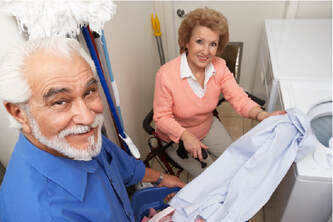For Better or Worse
For Better or for worse takes on a whole new meaning when caring for an elderly spouse or for a spouse who has experienced some sort of brain trauma. Even the best of marriages can experience some sort of strain but there are ways to address the challenges and keep hope alive in marriage. According to a 2015 joint report by AARP and the National Alliance for Caregiving, one in 10 caregivers take care of a spouse. Let’s see how caregiving spouses can feel more like a parent and less like a spouse.
Anticipate Changes and Stay Flexible
The first thing is to know there will be changes. There will be a shift in losses in various areas of the marriage whether it’s responsibilities, communication or intimacy. Take a moment and realize that change is happening and discover how to approach your changing marriage.
Adapt Your Roles
| You may need to reevaluate your roles. For instance, if your spouse typically did the cooking or finances you’ll need to take on this role. Realize that you won’t need to do it like he or she did. But adjust your mentality and know that it needs to be done. If you need to ask for help, don’t be afraid to call in help from a sibling or another relative or friend. Take a look at the responsibilities and order them from most important to least important and decide how to conquer. |
If hiring someone to come in and help clean is necessary, figure out to budget for this and bring in the help.
Caregiving is big on you emotionally and physically so bringing in help may be necessary to prevent burnout or frustration issues. Try your best to talk with your spouse and let him or her know what needs to be done in order to continue caring for your marriage.
Avoid Isolating Behaviors
Don’t isolate yourselves. When you start caring for your spouse it may be easy to separate yourselves from the outside world. This can cause tempers to flare or even sadness to come into play. Find a way to talk or meet up with another couple or family or even attend therapy with your spouse.
Find Local Support
There may be support groups at your local recreational or senior center or you may want to contact an in-home health provider and ask for suggestions. If you attend church or a religious organization, reach out to them and let them know you want to help out or are interested in being involved more. The point is to reduce isolation and increase social interaction safely.
Cultivate Healthy Communication
Cultivating healthy communication may be difficult depending on you and your spouse’s circumstances but it’s necessary for a healthy marriage. Learn to speak your partner’s language and tune in to how they respond. Do they like spending time together even if it’s just sitting at a park? Or do they enjoy receiving sentimental novelty gifts? Discover what makes them excited again.
It may be necessary to reach out to a therapist or in-home health provider for suggestions on the best ways to talk especially if there are physical changes complicating speech.
Remember to Care for Yourself
Finally, don’t forget to soak up a little time for yourself and let your spouse know you need a couple of hours to do something for yourself. Caring for another person can emotionally wreck you so remember to take care of yourself too and you’ll be a better caregiver overall.




 RSS Feed
RSS Feed